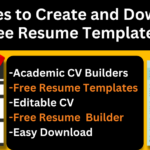Online College Student Experiences: Choosing where and how to attend college can be a big decision. Many students are also deciding between traditional, on-campus programs and flexible, online degrees. The National Center for Education Statistics reports that the number of students taking online classes is increasing, but as a prospective student, you may be unsure whether a web format is right for you.
Online College Student Experiences
Information from your manager can help you evaluate online programs and decide whether or not to pay for your degree. So what should you consider before enrolling as an online student? Almost 300 online graduates take part and are managed by VacancyEdu, offering an inside look at online studies.
Comparative Resources and Complaints
What would online graduates do differently if given the opportunity to re-enroll? The most common answer to the current question in our annual survey was “Compare more programs,” which means do your research and not limit yourself to one or two options.
According to a study by Learning House, prospective online students attend an average of 2.47 schools, and almost a quarter only attend one. That alone won’t be enough to determine the best combination for you. Please note that this “environment” comprises a large number of components, such as B. Academic and support services that support a student.
Students in our survey used a variety of, and sometimes multiple, resources to match online programs. Their top three resources this year were:
1. Making direct contact with schools
2. Reading Online reviews (e.g., Cappex, GradReports, and Unigo)
3. Ranking websites with a check-circle icon
However, don’t stop there.
The vast majority of online students (69 percent) begin their programs with career and work goals in mind. To achieve these goals, you need to look for programs that will prepare you to enter your desired field. Students in our study contacted professional associations, employers, and employment and salary websites for more information. As you research, consider the following questions: Will your prospective school’s programs provide employment or salary information to alumni? Do they need to enter into program partnerships with employers or other links with professional associations?
Choosing Online Programs
l Spend time investigating costs.
l Speak with potential employers in your field of interest.
l Consult with students and alumni from potential programs.
It takes time to find a good program that provides the experience and outcomes you seek. It also entails reaching out to a wide range of people and resources to gather the information you need to make an informed decision.
Preparation and Planning for College Finances
We are all aware that attending college, whether online or on-campus, is expensive and that student loan debt has risen significantly in the last ten years. The message from all of the coed groups involved in our study (e.g., prospective, current, and alumni students) is unmistakable: the financial implications are the most difficult aspect of the method.
According to our findings, the most significant barrier to graduation for online program graduates was “paying for educational activity while minimising debt.” This stems from one of the most significant challenges students face when deciding whether or not to pursue online education.
In the three years, we’ve polled online students, respondents’ top challenges have been “estimating actual costs” and “applying for help and identifying sufficient funding.”
In our study, online program graduates stated that the most difficult barrier to graduation was ‘paying for education while minimising debt.’
How are you able to benefit from these lessons? Begin by making a budget. Consider how the addition of school costs and loan repayments will affect your financial situation. Paying for faculty should be a one-time event, not a lifelong commitment. Plan ahead of time and prioritize your spending while you’re studying.
Spend time connecting with admissions and assisting advisors at each school you’re considering for detailed cost estimates. You should also look into online resources, such as the US Department of Education’s StudentLoans.gov website. This website includes a self-paced Financial Awareness Counseling tutorial, which is intended to “help you understand your aid and assist you in managing your finances.”
The cost of attending school is an ongoing expense. Many of the web students in our study expressed a desire to obtain a college education from a variety of sources, and the mix varies from year to year. You’ll even have to reapply for aid, scholarships, grants, and various other revenue streams on an annual basis. Every year, go over your college funding sources and personal finances to ensure you’re still on track.
Set realistic expectations in terms of requirements, opportunities, and priorities.
What does it feel like to be a web student? The experience has evolved over time as the tools students use to connect with one another, professors, and course materials online have changed. Students in our study shared a variety of details about their experiences, some of which you might not expect:
You may have real-time meeting requirements.
Some faculty use synchronous technology (e.g., web or video conferencing software) to interact with students in a live lecture or discussion, even in a “fully online” course. This year, 60 percent of researchers reported synchronous meetings in their online courses. Meetings can improve interaction and understanding, but they add a planning component that you might want to organize.
You might want to visit the campus.
Almost half (46%) of the net students in our study do so by choice or as a result of a requirement. You may be required to take proctored tests in a physical location, for example. You’ll also have access to a variety of services and activities, such as in-person advising and school office hours, as well as fitness centers and student clubs.
Your class is more diverse than ever before.
Your peers could be 18 or 50 years old, from across town or from the other side of the world. Online education has long been popular among working professionals, and this trend is expected to continue, but younger enrollments are increasing.
Recent high school graduates and students still in high school are discovering that online education is a versatile way to earn college credit and shorten the time it takes to earn a degree, often while working. Many on-campus students are also taking online courses for the same reasons.
Life happens while you’re at school.
Balancing work, family, and faculty presents challenges. Online students change jobs, marry, and have children. They frequently lose their jobs, are caught in a natural disaster, or face another unexpected hardship. According to online alumni, the second most significant barrier to graduation is “reacting to unexpected life events.”
Consider how your schedule will change and who you will rely on for assistance while you are a student, especially if unexpected events shift your priorities.
Do Your Homework: Take Advantage of Online Education
Overall, the future looks bright for online students. This year, 85% of graduates said they would recommend online education to others. It is not necessarily easier to be told online versus on campus, nor is it necessarily more cost-effective. Learning online, on the other hand, allows students to continue working while studying and supporting a family.
If you’re considering an online degree, more than one online program will most likely meet your needs and preferences, but there are still many options. Consider the suggestions of previous students—specialists in online education. Lessons learned can not only help you make an informed decision about your education and the opportunities provided by these programs, but they can also help you achieve your graduation and career goals.
Read also
How to Become an Astronaut and What to Study?
What Kinds of Jobs are Available After Boot Camp?
Best Online Anthropology Degree Programs of 2021
Best Online Master’s Degrees in Human Resources Programs of 2021
2022 Best Online Associate in Computer Science Programs
Best Online Masters Degrees in Education and Development Programs 2021
Related Posts
- Online PhD Programs: Pros and Cons, Universities, Courses, Career.

- Top Websites to Create and Download Free Resume Templates

- Top 25 Free Statistical Analysis Software 2024

- What is a letter of intent (LOI)? Meaning with Sample

- Polite Follow-Up Email to Professor : When and How You should Write

- PhD in Psychology : Career, Admission Process, Benefits, Opportunities.

- What is PhD : Meaning, How to Do, Benefits, Full Details

- How to Write a Motivation Letter for PhD, Postdoc, or Any Position: Sample Motivation Letter

- How to increase Brain Power – Secrets of Brain Unlocked

- Postdoc Application Cover Letter Template

- How to write a Postdoc Job Application or Email

- How to Write a Curriculum Vitae (CV) for a Job Application

- Five Steps of Writing a Great Resume

- How to Write an Effective Cover Letter

















